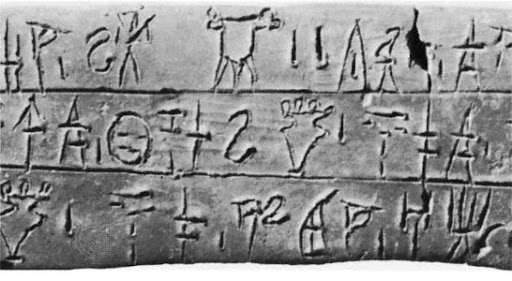The world is made up of a wide range of languages, from Portuguese to Russian, to Mandarin. But, today I will be looking at one of the oldest Indo European languages: Greek!
The Greek language originated in Greece before 1600 BCE, according to Britannica, an online encyclopaedia, with some of the earliest Greek scripts dating back to 1500, and 1400 BCE from Mycenae. The Mycenaean writing system fell out of use between 1200, and 1100 BCE, and a more efficient Greek alphabet was developed, largely derived from the alphabet of the Phoenicians, who spoke a Semitic language. However, it was only in 403 BCE that the Classical Greek alphabet, which is used today by Greeks, was officially adopted.
Part of a Mycenaean script (source: Britannica)
In 334 BCE, according to National Geographic, Alexander the Great invaded the Persian Empire, spreading the Greek language and culture as far as India and Spain. He replaced the majority of Greek dialects spoken in different parts of the world with Koine Greek, which has a strong resemblance with the modern language. Babble, a language learning app, estimates that nowadays nearly the entire population of Greece, 10.7 million people, speaks Greek. Cyprus is the only other country where Greek is an official language. However, it is also spoken by hundreds of thousands of people in Greek communities of the diaspora.
There are similarities between both the modern, and ancient Greek language with Latin, in terms of their complex grammatical structures. Surprisingly, German too, shares much of its grammar with Greek. Furthermore, the Latin alphabet, used in many European languages such as French, Spanish and English, is a descendant of the Greek alphabet, according to Britannica. In terms of vocabulary, English and other languages have ‘borrowed’ many Greek terms, for example ‘φοβία’ which translates to ‘phobia’, meaning fear. Many more have their etymology in Greek, such as “hexagon” and “polygon, a shape with six sides and a shape with many sides. The word “εξι” (exi) means six, “πολυ” (poly) means many and the suffix “-gon” means angle, as explained by WordReference.com, an online dictionary. Thus, the translations of “hexagon” and “polygon” give you the meanings “six angles” and “many angles”. In addition, many mathematical and scientific symbols are Greek, for example ‘π’ used in circle-related problems in mathematics, ‘ε’ for ‘efficiency’ in science and ‘ξ’ for the universal sets of Venn diagrams.
However, there have been concerns about the reverse happening. As put by Helena Smith from The Observer, a magazine of The Guardian, the Greek language has been ‘deluged by English terms’. Professor Georgios Babiniotis, former education minister, and Greece’s leading linguist, fears that the pandemic has worsened the impact of English. Phrases such as ‘lockdown’, ‘click-and-collect’ and ‘curfew’ are being used frequently, in both written and spoken language, while their Greek counterparts are being ignored, even by the government.
Over the past years, Greek companies have increasingly adopted English names, and slogans. American films, and music are highly popular in Greece, and tourism is a huge part of the economy. In fact, 10% of employment was in the tourism industry in 2018, according to OECD iLibrary, the online library of the Organisation for Economic Cooperation and Development. OECD iLibrary also recorded roughly 3,000 visitors from the UK in 2017, and a slightly lower number the following year.

The influence of the English speaking world on everyday life is visible, with Greek business owners anglicising their businesses in hopes that their English will attract business from tourists. In other cases, English sounding names appeal to local buyers as American music and television is popular in Greece. As a result of this, one of Greece’s largest supermarket chains is called ‘MyMarket’. American names for foods, have also been populating Greece’s menus, with many restaurants and cafés now offering ‘κεικ’ (pronounced cake), ‘χαμπουργκερ’ (hamburger) and ‘σαντουιτς’ (sandwich) even though, there are the Greek alternatives ‘τουρτα’, ‘μπιφτεκι’ and ‘ψωμακι’.
Babiniotis fears that the Greek language, having withstood ‘the test of time’ for 40 centuries, may be crumbling. With the spread of English, it is important to many linguists, such as Babiniotis, that not only Greek, but all ancient languages are taught to younger generations to secure the future of the historic tongues.
by Maria

